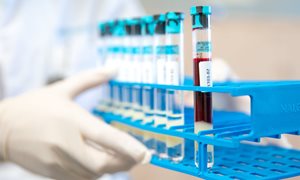9 July 2018
Researchers Dorien Kiers (photo up) and Matthijs Kox, theme Infectious diseases and global health, discovered that these low oxygen levels also inhibit the immune response. The signaling molecule adenosine and the anti-inflammatory protein interleukin-10 play an important role in this process. In their article on this study, in EBioMedicine, Dorine Kiers and Matthijs Kox concluded that low oxygen levels may protect the body against excessive inflammation.

A severe inflammatory reaction can be harmful to the body. An example of such a reaction is sepsis, often called blood poisoning, which occurs frequently in ICU patients. At the same time, these patients often have a reduced oxygen supply to their vital organs. Kiers and Kox, who are Intensive Care researchers of Radboudumc, therefore wanted to elucidate the relationship between these two phenomena. Kiers: “If the oxygen levels of the patient have an effect on the immune response, we may be able to control this response intentionally. This could provide a simple intervention. You can easily control the oxygen levels by changing the settings on the ventilator (artificial respirator used in the ICU).”
 Patients in the intensive care unit (ICU) often suffer from inflammation and reduced oxygen supply to vital organs.
Patients in the intensive care unit (ICU) often suffer from inflammation and reduced oxygen supply to vital organs.
Researchers Dorien Kiers (photo up) and Matthijs Kox, theme Infectious diseases and global health, discovered that these low oxygen levels also inhibit the immune response. The signaling molecule adenosine and the anti-inflammatory protein interleukin-10 play an important role in this process. In their article on this study, in EBioMedicine, Dorine Kiers and Matthijs Kox concluded that low oxygen levels may protect the body against excessive inflammation.
A severe inflammatory reaction can be harmful to the body. An example of such a reaction is sepsis, often called blood poisoning, which occurs frequently in ICU patients. At the same time, these patients often have a reduced oxygen supply to their vital organs. Kiers and Kox, who are Intensive Care researchers of Radboudumc, therefore wanted to elucidate the relationship between these two phenomena. Kiers: “If the oxygen levels of the patient have an effect on the immune response, we may be able to control this response intentionally. This could provide a simple intervention. You can easily control the oxygen levels by changing the settings on the ventilator (artificial respirator used in the ICU).”
Simulated infection at 5000 meters
In a study with healthy subjects, the researchers investigated the effects of reduced oxygen levels on their immune response. The volunteers were given endotoxin, a pathogenic component of bacteria that causes an immune response, while wearing a kind of helmet over their heads. Kiers: “By mixing ambient air with nitrogen we were able to reduce the oxygen level of the air in the helmet. While we normally breathe air with 21 percent oxygen, the volunteers breathed air with about 11 percent oxygen. That is comparable with being at 5000 meters altitude, just below the summit of mount Kilimanjaro. This does not cause shortness of breath, but does result in lower oxygen levels in the blood. This combination of induced immune response and low blood oxygen had never been studied in humans before."Protection against excessive inflammation
Kiers: “Something interesting occurred, At lower oxygen levels, the volunteers produced twice as much of the anti-inflammatory protein interleukin-10, while the levels of pro-inflammatory proteins were halved”. Kox believes this anti-inflammatory effect of low oxygen levels could be a protective mechanism of the body against excessive inflammation: "Reduced oxygen supply to vital organs often occurs with inflammation, partly because the blood circulation deteriorates. This could be a mechanism to protect the organs against an excessive immune response that causes damage."Underlying mechanism
The researchers also found that volunteers who were exposed to a reduced oxygen level had more adenosine in their blood. To further elucidate the underlying mechanism, the researchers performed similar experiments in mice lacking genes for adenosine and interleukin-10. These experiments showed that reduced oxygen levels lead to increased production of adenosine, which in turn enhances the production of interleukin-10. As a result, the production of pro-inflammatory substances is strongly inhibited.Potential uses of the newly discovered pathway
Despite the promising results, Kiers thinks it is too soon to start reducing oxygen levels in the treatment of ICU patients: “It is a simple intervention, and is certainly technically feasible, but further research is needed to determine whether it is really safe. Our study involved healthy subjects, not patients who are severely ill. We have studied the mechanism. Once this is understood, a subsequent step is to determine whether it is possible to treat patients with medication that impacts this pathway, but without subjecting them to reduced oxygen levels.”Related news items
.aspx?width=4000&height=2659&ext=.jpg&type=BlockColumn1Zoom1)
Antihypotensive agent disrupts the immune system in sepsis
11 June 2020 Patients who go into shock caused by sepsis are treated with norepinephrine. Researchers from Radboudumc published results in today’s American Journal of Respiratory and Critical Care Medicine revealing that its use is not without drawbacks. go to page
A personal touch of Jelle Zwaag
19 May 2019 In order to promote interaction amongst colleagues within RIMLS, we have a ‘personal touch’ series setting employees in the spotlight. A light-hearted manner to learn about the colleagues you know and those you don’t. This week: Jelle Zwaag. go to page
Supervisor of the year Matthijs Kox
16 January 2019 For the second time the RIMLS PhD council organized the Supervisor election with many nominees. This year's winner is Matthijs Kox, theme Infectious diseases and global health. go to page
Volunteering to become ill to help researchers understand infectious diseases
3 December 2018 Radboudumc has combined its research into controlled human infection models to create a new program: the Radboudumc Controlled Human Infection Models (RCHIM). go to page

